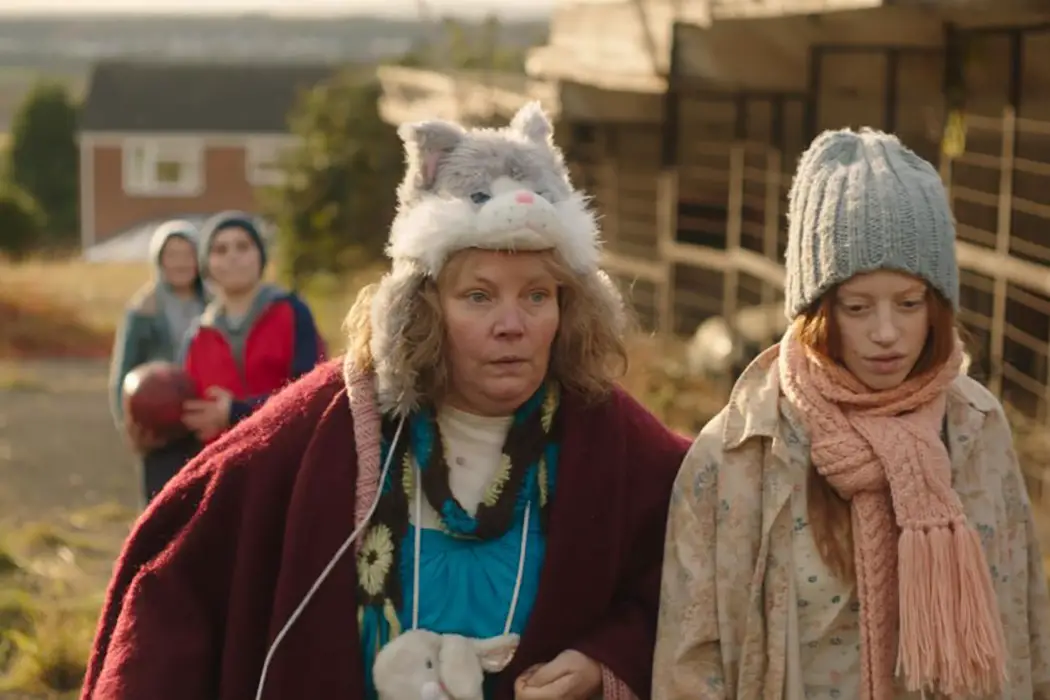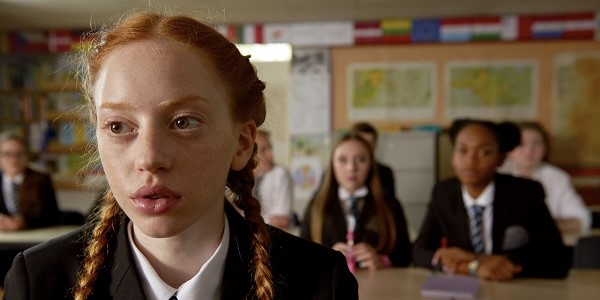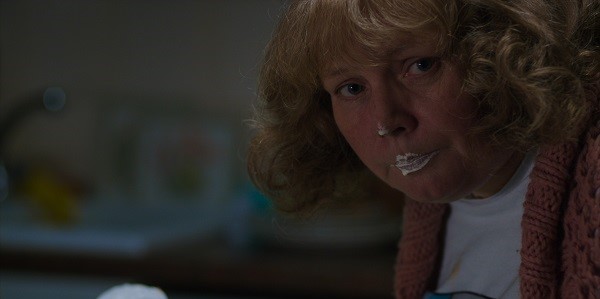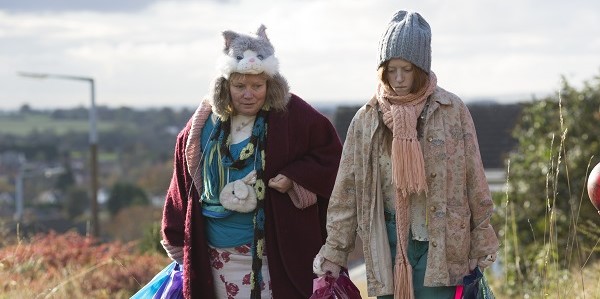In A Lonely Place: Interview With Deborah Haywood, Writer/Director Of PIN CUSHION

Lives by the sea in south-east England, with his wife,…
Hearing Deborah Haywood talk about how bullying scarred her as a child, and continues to do so as an adult, is genuinely upsetting. It’s obvious the memories – even decades later – are still pretty raw and the writer/director pours every bit of that hurt, confusion and anger into Pin Cushion, her debut feature, which is comfortably the best British film I’ve seen so far this year.
“I was bullied at school and, sometimes, I even get a flash of it now, in a certain situation,” she says. “Suddenly, I’m plunged back there to that horror, that fear of, you know, ‘Don’t cry in front of everyone or crumble and fall onto the floor’ – and that still scares me.”
Lyn and Iona, the mother and daughter in Pin Cushion – played by The Thick Of It’s Joanna Scanlan and newcomer Lily Newmark – are both victims of the kind of sustained cruelty Haywood herself suffered. Funny, genuine, and passionate about her craft, even down a phone line the Derbyshire-born filmmaker makes engaging company. But she’s incredibly candid too.
“How do you negotiate the world when you’ve been damaged by bullying and it has had a lasting effect on you? It’s those emotional things I’ve drawn on [for the film] because it’s such a lonely experience – you feel so vulnerable and it’s humiliating and there’s so much shame involved,” she says. “But you hide it, or you try to pretend it’s not happening – you develop all these weird coping mechanisms to deal with it. And I think it’s that loneliness that’s always stayed with me.”

Sympathetic and Credibly Drawn
Haywood describes Pin Cushion as “a dark fairy tale about an oddball mother and daughter who move to a new town, and what effect that has on their co-dependant relationship”, but, whilst succinct, that summary leaves an awful lot out. Yes, it’s a fairy tale of sorts, but also a coming-of-age story, a meditation on isolation, scuppered hopes, trying and failing to fit in, coping with disability, and casual cruelty.
Iona and Lyn’s intense relationship – they call each other ‘Dafty One’ and ‘Dafty Two’ and share a double bed – is sympathetically and credibly drawn. There are also nods to Brian De Palma’s horror classic Carrie and a rich vein of humour, which includes some terrifically-delivered one liners (“My daughter’s a sexual maniac and I need some friends”) and a couple of similarly impressive sight gags. To say it is multilayered would be damning Pin Cushion with faint praise.
Of her film’s fairy-tale element, Haywood – who cites Ágota Kristóf’s bleakly humorous novel The Notebook as another influence – says: “I’ve always loved fairy stories because they are so dark. I loved being scared when I was little – hearing about Rapunzel locked in that tower or Sleeping Beauty being put to sleep for a hundred years was like, ‘Oh my god, that’s so terrifying’. It’s a safe place to explore those feelings and those actions. Whereas, if I’d tried to make this social realism, it would have been off-putting and too much, and not enjoyable for me to experience either.
“They are mother and daughter but, because of the fairy-tale thing, Lyn is more of a grandma figure. When I was writing and casting her, my references were Susan Boyle and Mrs Tiggy-Winkle.” Britain’s Got Talent singer Boyle is a subject we return to more than once during the course of our conversation.
Hurt and disappointment
Newmark’s debut as daughter Iona is memorable and striking, her red hair and sheer wide-eyed “otherness” reminiscent of Sissy Spacek, but it’s Scanlan who steals the show. The film opens optimistically enough with Iona and eccentric Lyn moving to a new town, but it isn’t long before the latter – who has a spinal deformity – becomes the victim of abuse both verbal and physical in the street. After the incident, Scanlan has a look on her face that tells you everything you need to know about the wretched life Lyn has led to this point. It is an expression of hurt and disappointment, but also a bitter realisation that everything is going to be the same as before, no matter how hard she tries to change it.
“Obviously, I wanted Susan Boyle but was told absolutely to forget that idea,” says Haywood of the casting. The director, it turns out, is fascinated by the singer because: “She looks like she could flip out and thrash everyone at any moment – you don’t know if she’s going to sing or wallop you, and I love that.” Haywood was looking around for an actress with a similar quality for the role of Lyn and says: “I wanted someone who definitely hadn’t had Botox, who looked very real. I think [producer] Gavin Humphries suggested Jo Brand, but she hadn’t quite got the right presence or aura.

“However, I liked the woman opposite her [in BBC hospital comedy Getting On]. Gavin said, ‘That’s Joanna Scanlan’, so I found an interview she did on the red carpet. She had that same Susan Boyle thing – she was listening really intently to this interviewer and had this unpredictable thing about her – is she going to bollock the interviewer or smile and answer beautifully? I just couldn’t tell which way it was going to go. And I thought, ‘I want to meet her’.
A rendezvous at a Manchester hotel followed (“We sat there talking for hours about everything and just really got on”), after which Scanlan agreed to join the cast. “I knew she’d really take care of Lyn and give her dignity and an intelligence,” says Haywood. “You could have played that role so differently, where everyone would have laughed at her. But I wanted audiences to feel the same way I do about Lyn. I want them to think about jumping into the screen to give Lyn a hug.”
More Colourful Than Life
Haywood’s work so far – this debut feature and five excellent short films – all focus to a greater or lesser extent on characters who are either children or teenagers (Pin Cushion’s Lyn is also somewhat child-like). The shorts include the whimsical Sis (2011), about two very young girls who stumble into the home of an alleged paedophile, and Tender (2009), about a teenage boy going to great lengths to break up the relationship between his mum and her abusive boyfriend.

“It’s a time of life where things are happening all the time, everything’s an adventure, everything feels larger than life, more colourful than life,” says Haywood of her predilection for telling teenage stories. “You don’t know yourself, so you often put yourself into situations you haven’t fully thought through. We make so many silly decisions as teenagers and take so many risks – we haven’t thought through the consequences. And that makes for exciting cinema and stories.”
Nightmare horror
Haywood has a couple of ideas bubbling away for her next project, including a musical take on material she started to explore in Sis. However, she seems most excited about the possibility of making a “nightmare horror”.
“I had post-natal depression and this awful recurring dream that there was this huge owl on my shoulders. It was so heavy, and I was dragging it around,” she explains. “[In the dream] I’d go to friends’ houses and I’d be trying to say, with my eyes, ‘Please help me, I’ve got this great big thing on my shoulders,’ and they’d see it and be scared of it as well. It was a metaphor for depression because people are scared of it and gradually edge away from you if you’ve got it.”
Pin Cushion is in select cinemas across the UK now, and released in the US from Friday, July 20. Go here for further release information.
Does content like this matter to you?
Become a Member and support film journalism. Unlock access to all of Film Inquiry`s great articles. Join a community of like-minded readers who are passionate about cinema - get access to our private members Network, give back to independent filmmakers, and more.
Lives by the sea in south-east England, with his wife, kids and cats. You are cordially invited to check out his film and comics-flavoured website - andywinter.online - and follow him on Twitter @andywinter1













